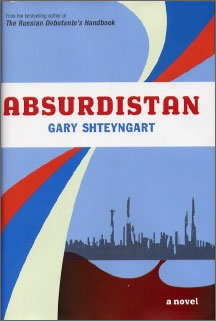 |
 Gary Shteyngart
Gary Shteyngart
Absurdistan
Reviewed by: Rick Kleffel © 2006
Random House
US First Edition Hardcover
ISBN 1-400-06196-2
Publication Date: 05-02-2006
340 Pages; $24.95
Date Reviewed: 06-07-06
Index:
General Fiction
Only when you read language at its most powerful do you realize just how powerful language can be. But it's difficult to realize this because so often the language that aims to move us or tries to change us ends up annoying us. Language that tries to be powerful tends to sound pouty. And the language that does manage to move us often moves us to laughter, which is easily discounted. It's just humor, we think; a good joke.
Gary Shteyngart knows the power of a good joke and he knows a thing or two about the English language. In 'Absurdistan', he crafts more than 330 pages of beautifully turned sentences, each one a minor masterpiece. Fortunately for the reader, they're in the employ of a man with a wild and imaginative sense of humor. It's difficult to tell whether Misha Vainberg, the morbidly obese, 325-pound protagonist of 'Absurdistan', gets under our skin because he's so funny or whether he's so funny because he gets under our skin. But there's no doubting that Shteyngart is both hilarious and compelling, at once sentimentally sweet and grotesquely crass. Give Misha half a page and you'll want to hang around for the next 338.
'Absurdistan' is written in the form of one long love letter, to life, to New York, to Misha's many women, to great food, to the INS in hopes that they will let Misha back into America. Educated at Accidental College in Middle America, Misha has made the mistake of returning home shortly before his father, the 1,238th richest man in Russia, has an Oklahoman businessman killed. This makes Misha unwelcome in the US, and those portions of the novel that are not memories of his life here describe his attempts to return. Eventually, he ends up in Absurdistan, as the Minister of Multicultural Affairs, hoping to use his position to gain re-entry into the US; more precisely New York, more precisely still, the South Bronx.
If this all sounds convoluted and complicated, that's because it is. But among the many beauties of this book is the complex structure that seems utterly, seamlessly naturally mashed up and mixed up, shaken and stirred, remixed and re-mastered. It's a diverse world and Misha has spent a lot of time roaming through the shattered remains of what was once the Soviet Union and the so-called Eastern Bloc. Shteyngart handles all this globe tripping with the telescoping effect of stories within stories and stories that require the telling first of other stories. The reader experiences the novel as one might a visit from a garrulous old friend, whose recent history is only sketchily known. As the details fill in, big chunks of time and tale suddenly connect. It's the storytelling equivalent of a rather breathtaking special effect.
Shteyngart manages to pull off his special effects with language so skillful you'll never suspect how skilled he really is. There's not a word wasted, not a sentence misplaced or a scene transition that is not positioned with incredible care. Yes, Shteyngart is very, very funny, on all levels. He gives the guffaws from intelligent but very dirty jokes, he evokes the careful laughter of satiric masters. He's very, very bad. There's a segment of nearly ten pages of Holocaust jokes here. Misha endures a botched circumcision at the very tender age of eighteen. And that's just the easy stuff. Yet it's only possible to laugh at all this incredibly distasteful humor because Shteyngart makes the obese Misha truly engaging and lovable. Sure, he's selfish and a craven hedonist, but he's entirely good-natured and unselfconscious about his greed and avarice. He beds his late father's wife shortly after his father's death, and yet we feel sorry for him. Sentence by sentence, phrase by shrewd phrase, Shteyngart has carefully pared away every single word except those which work. And the evidence that he has done so is that there is no evidence he has done so.
For all the paring and laughter, 'Absurdistan' is a richly evocative work of literature with many nods to classics that it evokes and that time is likely to prove it is equal to. Whether this is Dostoyevsky by way of Hunter Thompson or Mark Twain meets Turgenev, or the oft-mentioned-in-the-narrative Oblomov by Ivan Goncharev cross-fertilized with Notorious B. I. G., it is clearly the work of a mind familiar with all of the above and the world at large. 'Absurdistan' offers many moments that are clearly and admittedly from the author's life, to the point where he creates his counterpart in the form of Jerry Shteynfarb, the Russian émigré author who steals Misha's girlfriend while he is trapped abroad. For every wonderfully faux Fodor's travel guide entry there is a moment of surprisingly powerful pathos, confrontations with abusive but loving parents, the discovery of feelings where none are thought to exist.
'Absurdistan' is an engaging journey through both a world and a mind, through our time and yet itself timeless. For all the topical references and in-jokes, what turns the crank at the center of 'Absurdistan' is nothing less common, nothing less powerful than the human heart, crushed and reborn, broken and mended, stopped and started. When that crank turns, when the blood flows, so too, does the language. And it is no coincidence that the first physicians deemed that blood was one of the four cardinal humors. It is language, ever powerful, ever bloody, ever humorous, that moves us, that drives us on our journey from wherever we are to our own private 'Absurdistan'. If we are lucky, we can return home.
|
 |
